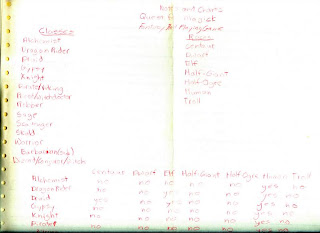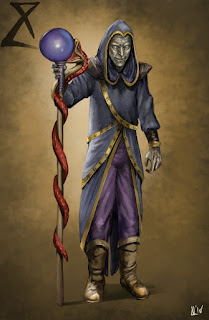Amateur RPG Design: Quest for Magic
 |
| Part of my old notes for "Quest for Magic", circa 1986 |
I think part of the psyche of playing a role-playing involves that creative urge where you strive to understand the system and then think of ways to make it better. How many times have you met someone who says, "I'm completely happy with the rules of [insert their RPG system of choice]?" I'd venture to say, never. Rather you're more likely to hear something like "I like D&D, but I hate Vancian spell casting, so I changed it to a spell-point system" or "Gamma World is okay, but I wish it had classes or skills." The large amount of OSR blogs is pretty much a testament to this level of creativity and the need to tinker with the rules.
Recently, while on a continued quest to clean up my home office, I was looking through some of my old gaming notes and found yet another custom RPG game I was trying to create. I didn't date these notes, but based on the paper I was using (very old 13" x 11" dot-matrix printer paper that I my dad brought home from his office for us to use as scratch paper) I'd guess it was probably around the Summer of 1986, which would put me at almost 16 years old.
At this point, we had moved away from the group of kids who originally taught me the game, and I was gearing up to go to a new school for my Junior year of High School. The Summer was spent adjusting to our new neighborhood in Southern California, and with me spending a lot of time by myself (as, since I was new to the area and hadn't started school yet, I didn't know anybody). Most of this "alone time" was spent working on various ideas for D&D campaigns and new role-playing games. Over the course of about four years, I tried to create no less than four RPGs, including ones based on themes of Arthurian England, Atlantis, a post-apocalyptic "car world," and the subject of today's post, one in which the magic of the world had been lost and the characters were on a quest to recover the source of magic.
One thing I've noticed when going through these old notes of mine is that I wasn't really creating new games, or new rules, but rather, I was essentially creating new settings for D&D. At that time, having pretty much spent most of my gaming time playing D&D and Gamma World (which pretty much share the same basic mechanics), along with only a smattering of Top Secret, Boot Hill, and Star Frontiers thrown in, I was really only familiar with class-and-level systems that used the full array of polyhedral dice. So, all of my custom game creations are, for the most part, just riffs on D&D that change the setting.
About 10 years ago, I would've looked upon that as a failing and instead thought that I wasn't being creative enough, or clever enough, to develop brand new game mechanics for things that I didn't like about D&D. As it is now, though, I am, more and more, preferring a "less-is-more" approach to game mechanics. As an example, I saw this great post over on Stuart's "Strange Magic" blog, wherein he creates a Dune-like "Bene Gesserit" class for B/X D&D by essentially making it a cleric and creating a way of representing the power of "The Voice" by modifying the Turn Undead mechanic to work on humans instead of undead. A "T" result means the character can Tell the target to do one thing, and a "D" result means the character Dominates the target (as per the spell). That's such a simple, elegant solution versus what I personally would have done a few years ago, which is create a whole new class with brand new mechanics to account for stuff like The Voice.
Back to my notes on "Quest for Magic" - this one really didn't ever get very far off the ground, and it was really all over the place. It started out as an RPG wherein every player would have to play a magic-using class. This was way before Ars Magica (or, at least, way before I saw or head of Ars Magica), so I thought I was being incredibly cool and clever by creating this concept. So, I created a bunch of character classes like Alchemist, Druid, Priest/Witchdoctor, Sage, Wizard, and two wizard sub-classes: Witch and Conjurer.
The races took an odd turn, mimicking some stuff that I had recently read in the CS Lewis stories, so Centaurs were available as a character race, as were the ubiquitous Dwarves and Elves. As mentioned here on my blog before, I generally hate the "small races," so I didn't include Halflings or Gnomes. After having read an article in Dragon magazine about other races, I decided to include Half-Ogres, since I wanted to get some use out of that article. I also added Half-Giants (and this was about four years before Dark Sun came out), and also Trolls as character races. As I said, it was really all over the place.
Aside from the idea of having Half-Ogres, Half-Giants, and Trolls play magic-using races, another very odd thing that wouldn't have worked was the basic premise of the setting, which was that the source of magic had been destroyed, so the main goal of the characters was to re-discover it and bring it back to the world. I think I probably borrowed this idea from Dragonlance, which was brand new at the time and involved the idea of characters re-discovering the gods, and therefore, divine magic. Dragonlance, as has been discussed ad nauseum throughout the OSR, was a "story-based" series of modules, and as that was en vogue at the time, my "Quest for Magic" game mimicked that pattern.
So, two problems with my game are immediately evident. Firstly, if magic doesn't work, then having only characters with magic-based powers doesn't work. Secondly, once the characters do find the source of the magic and return it to the world, then the setting just becomes "Every Generic Fantasy Setting Ever" (we'll call it EFGSE for short).
I never did deal with the second part of the problem, but for the first part, I created a bunch of new classes, including Barbarians, Dragon Riders, Gypsies, Knights, Pirates/Vikings, Robbers, and Scavengers.
My initial write-up describing the background of the world went like this:
"About a month ago, a collassal [sic] catastrophe occurred. Everyone felt weak. The plants became wilted. Men lost their strength. No one knew what was happening. Until now. Your group was searching through the Tharbad Forest and you found a huge hole. You searched it and found that your magic powers were somewhat enhance inside the hole. When you left, you felt weak and almost powerless. After studying for a week, you came up with an almost unbelievable story. The magic had left your area of the world and had gone to another.
The object of the game is to find the magic. One the way you will meet many obstacles and monsters. It won't be easy. So now, let's begin."
Yep, that's the kind of introduction that could only be written by a cocky 15 year-old who thinks he's the most awesome thing to ever happen to game design and trying to copy the style of writing found in poorly written RPG supplements that came out in the early and mid 1980s. Good times. I do think it's interesting that it's a mixture of my background in RPGs at the time - the old-school stuff from the late 1970s wherein on a module would just flat out say "You just spent the past two weeks tracking down a sacred artifact and found yourself at the entrance of a ruined temple" - no long backgrounds, no "how did our characters meet each other" sessions, etc. You were just told what you needed to know to get started. This was balance, of course, by having an "object of the game" - and a story-based one ("find the lost source of magic") that was clearly the prevailing trend of what is called "Silver Age" RPG design at the time.
Aside from creating some characters and writing the introduction, I never got much further into developing "Quest for Magic." Although it's extremely primitive and the class and race options don't really hang together, I'm still intrigued by the idea of a sort of post-apocalyptic fantasy setting populated by a bunch of different styles of magic wielders trying to survive.
I've written a few posts in this series of "Amateur RPG Design" and I'm so curious to hear everyone else's experience and if you still have your old notes tucked away somewhere.
Hanging: Home Office (laptop finally fixed!)
Drinking: Looking forward to a pumpkin ale with dinner
Listening: "Alice in Wonderland [Take 2]" by Bill Evans



You should totally send a copy to the Plagmada archives.
ReplyDeletehttp://plagmada.org/Home.html